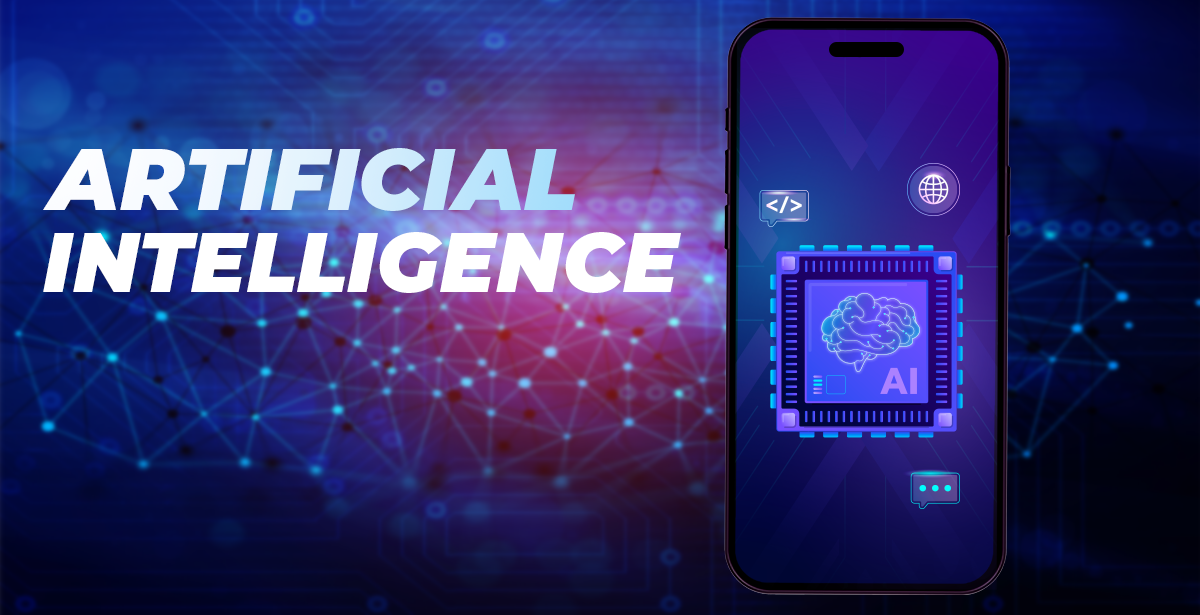You may be interested in hiring a mobile app development company to bring your million-dollar…
AI Mobile App Development – What’s the Big Deal?

AI mobile app development is shaping the next generation of apps, delivering endless possibilities and opportunities for innovation.
This may come as no surprise as artificial intelligence is a transformative, cutting-edge technology. However, you’d be missing out on many potential benefits by not adding AI apps to your to-do list in the near future.
The Demand for AI Mobile App Development by the Numbers
True to its name, AI is technology that enables computer systems to simulate human intelligence.
Built upon pattern recognition, its capabilities empower it to learn, recognize, solve problems, make decisions, and imitate reality. This allows it to perform tasks as complex as interpreting speech and driving cars.
AI is changing the landscape of technologies across the board, and mobile app development is no exception. We are in the era of the smart app; in the next ten years, we’re likely to see it transform the app experience for good.
If you need evidence, just take a look at the numbers –
- With a CAGR of 33.7%, the market for AI in mobile app development is expected to hit $249.8 billion by 2033. That’s up from $16.7 billion in 2023.
- Sensor Tower reported that, in the first 8 months of 2024, global revenue from chatbot apps had already surpassed 2023.
- According to Twilio Segment’s 2023 State of Personalization report, up to 90% of businesses use AI personalization to attract users. Given that Epsilon research suggests personalization makes 80% of customers more likely to buy, it’s a strategy that works.
- McKinsey estimates that generative AI alone could raise profits by up to $4.4 trillion a year. That’s through an impressive 63 use cases, such as writing code and producing creative content.
How AI Mobile App Development Reigns Supreme
The stats make one thing clear: AI for apps is in high demand, and it’s only getting higher. Driving these stats and the popularity of AI mobile app development are the following benefits.
Enhancing App Security
As technology becomes smarter, so do hackers. The best countermeasure for this is a tool that can keep up with the ever-changing tactics of hackers and cybercriminals.
Learning and adapting continuously, AI algorithms can detect erratic user behavior that may signal threats, malware, and fraud. It can also flag vulnerabilities in your software that leave it open to exploitation.
This keeps your app – and more importantly, your users’ data – safe and secure.
Enabling Tailored Recommendations
If you take these predictive insights one step further, AI mobile app development can tailor the user journey to each user.
It does this by creating individual profiles and populating them with data on everything from preferences to location. The patterns that emerge from this data enable AI to generate dynamic content, bumping up conversion rates and driving engagement.
Improving User Experience
AI’s predictive capabilities allow it to share unique insights on how your users interact with your app. This information can help you weed out pain points, optimize features, and gear the user journey toward their needs.
Your users can directly benefit from AI-driven insights too. By forecasting market trends and drawing up cost comparisons, AI helps users make informed decisions and smarter investments.
Automating Lower-Level Tasks
Not only does AI mobile app development benefit the user, but it also benefits your own staff.
AI’s intelligence allows it to take over repetitive tasks and complete them much faster than a human could. And this frees up your human team to handle higher-level tasks.
In the long run, it’s a cost saver your bottom line will thank you for.
Use Cases of AI in Mobile Apps
The benefits are enough to pique anyone’s interest, but the real fun is in the specifics.
AI for mobile app development takes on many different forms depending on what function it carries out. The following four are especially popular and can inspire your next app.
1) Personalization Engines
This AI-driven tool assesses each user’s behavior on your app to show them the content they’re most likely to enjoy. That way, every recommendation is exactly what they’re looking for or something they didn’t know they wanted.
And the more they use your app, the better your app knows them.
Amazon is the prime example of how AI’s personalization capabilities fuel eCommerce traffic, boosting sales and retention time. Netflix, Spotify, and YouTube also employ personalization engines to supply users with an endless stream of new, exciting content.
2) Image Recognition
Drawing from huge databases, pattern recognition algorithms have become so sophisticated that AI can now easily interpret visual content. The possibilities are endless for how this function can be applied, but here are just a few –
- Recognizing individuals by their faces
- Counting people and vehicles to monitor public congestion and objects to track inventory
- Electronically transcribing image- or video-based text
- Detecting diseases in medical scans
- Using an image to find similar images (i.e., reverse image search)
From security to convenience, the benefits of image recognition make it a perfect use of AI for mobile app development.
3) Chatbots
As far as customer-facing AI goes, the intelligent chatbot may be one of the oldest. But it’s come a long way from the experimental technology it once was, now fulfilling an important commercial purpose.
Many businesses opt for chatbot development to provide their app users with 24/7 customer support. With instant responses to basic inquiries, these bots reduce or even eliminate queues and wait times. They can even completely replace a dedicated support department.
If you want to optimize your user experience and resource allocation, a chatbot is the way to go.
4) Voice Recognition
The versatility of a machine that can interpret and act upon verbal commands is what makes Natural Language Processing (NLP) so revolutionary.
Its capacity for real-time transcription enables advanced quality-of-life functions like speech-to-text, autogenerated captions, and even translations.
But that’s only the tip of the iceberg.
This use of AI also gave rise to the now commonplace virtual assistant. With one of these on board, your users will be able to operate your app hands-free. They can –
- Search through your app and return desired information, products, or services
- Set reminders, timers, and to-do lists
- Send text messages and join calls
- Verbally narrate the user journey, allowing users to navigate without looking
Interested in Creating Mobile Apps with an AI Twist?
If you’re looking into AI custom mobile development, DPL is on the case. Our team has the experience and skills to make it a masterpiece. And we’re as excited as you are to helm the next generation of cutting-edge apps.
Just fill out the form below and let us know how we can turn your AI-powered dream into a reality.





